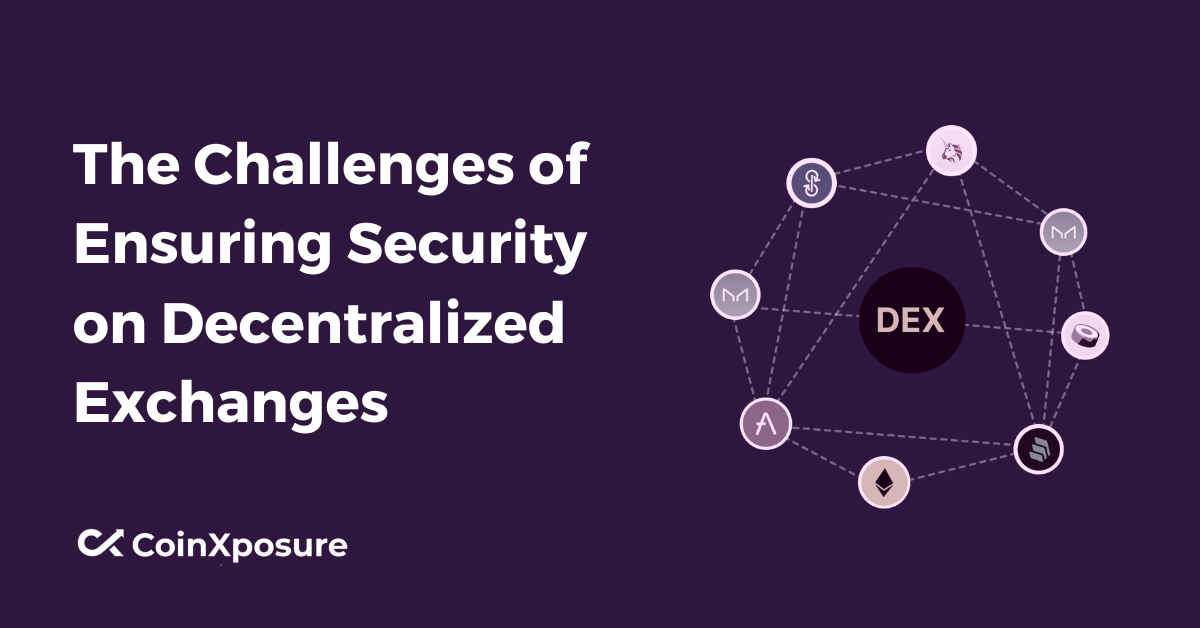As decentralized exchanges (DEXs) continue to gain prominence in the world of cryptocurrency trading, the issue of security becomes increasingly critical.
Unlike traditional centralized exchanges, DEXs operate on decentralized networks, introducing a set of unique challenges that must be addressed to safeguard user assets and maintain the integrity of these innovative trading platforms.
This article explores the multifaceted challenges associated with ensuring security on decentralized exchanges, encompassing smart contract vulnerabilities, the absence of centralized oversight, liquidity risks, and the imperative role of user education in navigating this evolving landscape.
Smart Contract Vulnerabilities
Smart contract vulnerabilities represent a significant challenge in ensuring the security of decentralized exchanges (DEXs).
These vulnerabilities stem from flaws in the code governing the execution of transactions and protocols within the smart contracts that power DEXs.
Exploitable code can lead to various security breaches, including unauthorized access, funds manipulation, and even full-scale network compromises.
Addressing and mitigating these vulnerabilities is crucial to establishing a robust and trustworthy foundation for decentralized exchange operations.
Regular audits, code reviews, and adherence to best practices in smart contract development are vital measures to enhance the resilience of DEXs against potential exploits.
Lack of Centralized Oversight
The lack of centralized oversight poses a significant challenge to the security of decentralized exchanges (DEXs).
Unlike traditional exchanges that operate under centralized authorities, DEXs function on distributed networks without a central governing body.
This absence of oversight brings about regulatory uncertainties, making it challenging to enforce compliance and respond effectively to illicit activities.
Navigating these challenges requires innovative approaches to regulatory frameworks and collaborative efforts between the cryptocurrency community and regulatory bodies to strike a balance between decentralization and regulatory compliance, ensuring the integrity and security of DEX operations.
Liquidity Risks
Liquidity risks present a notable challenge in the realm of decentralized exchanges (DEXs).
Thin order books and the absence of a centralized entity managing liquidity create an environment where market manipulation and significant price fluctuations can occur more easily.
Traders may encounter challenges with trade execution, facing increased slippage due to limited liquidity.
Mitigating liquidity risks on DEXs requires strategies such as incentivizing liquidity providers, implementing effective market-making algorithms, and exploring solutions that enhance overall liquidity depth, contributing to a more stable and secure trading environment.
User Education and Responsibility
User education and responsibility play a pivotal role in addressing security challenges on decentralized exchanges (DEXs).
As users have greater control over their funds in a decentralized environment, understanding the importance of secure practices, such as proper private key management, is paramount.
Educating users about potential risks, scams, and the nuances of interacting with smart contracts fosters a more resilient and informed user base.
Empowering users to take responsibility for their security enhances the overall strength of the decentralized exchange ecosystem, creating a collaborative approach to mitigating potential threats and ensuring a safer trading experience.
Potential Solutions of Decentralized Exchanges
Addressing the challenges of security on decentralized exchanges (DEXs) requires a multifaceted approach.
Implementing robust solutions is essential to fortify these platforms against potential threats and instill confidence among users.
Key strategies include proactive measures to address smart contract vulnerabilities, regulatory considerations, liquidity risks, and user education. Let’s explore some potential solutions:
- Audits and Code Reviews
- Integration of Decentralized Identity Solutions
- Regulatory Engagement and Compliance Frameworks
- Liquidity Enhancement Strategies
Audits and Code Reviews
Conducting regular security audits and thorough code reviews help identify and rectify potential vulnerabilities in smart contracts, enhancing the overall resilience of the DEX infrastructure.
Integration of Decentralized Identity Solutions
Incorporating decentralized identity solutions adds an additional layer of security, ensuring that users have secure and verifiable identities, which can aid in reducing fraudulent activities and enhancing trust.
Regulatory Engagement and Compliance Frameworks
Collaborating with regulatory bodies and adopting compliance frameworks tailored to the decentralized nature of DEXs can help address the lack of centralized oversight, providing a more structured and secure operating environment.
Liquidity Enhancement Strategies
Incentivizing liquidity providers through token rewards, implementing effective market-making mechanisms, and exploring interoperability solutions can contribute to deepening liquidity, minimizing risks associated with thin order books.
By combining these solutions, decentralized exchanges can strengthen their security posture, making strides towards providing a secure and trustworthy trading environment for cryptocurrency enthusiasts.
Conclusion
The challenges of ensuring security on decentralized exchanges (DEXs) underscore the evolving landscape of cryptocurrency trading.
Smart contract vulnerabilities, the absence of centralized oversight, liquidity risks, and the crucial role of user education collectively demand a comprehensive and dynamic response.
By implementing solutions such as regular audits, decentralized identity integration, regulatory engagement, liquidity enhancement strategies, and robust user education initiatives, DEXs can navigate these challenges effectively.
The success of decentralized exchanges hinges on a collaborative effort between developers, regulators, and users. Balancing innovation with security measures is essential for fostering trust and confidence in these platforms.
As the cryptocurrency ecosystem continues to mature, addressing these challenges head-on will be integral to the sustained growth and adoption of decentralized exchanges, ensuring they remain resilient and secure pillars within the broader blockchain landscape.












